Hormonal cystic acne can be tough and hard to beat. This guide will give you the best skincare routine, key ingredients, and strategies for clear skin. You’ll learn about the causes and symptoms of hormonal cystic acne, how hormones play a part, and how to follow a dermatologist-approved plan for your skin. Get ready to fight cystic acne and get a glowing, healthy complexion.
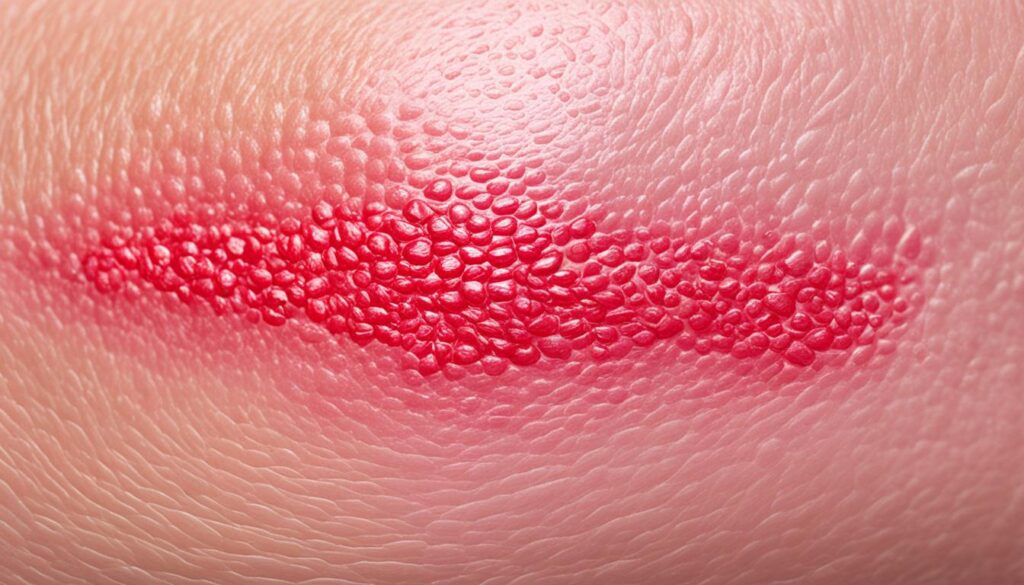
Key Takeaways
- Understand the causes and symptoms of hormonal cystic acne
- Discover the role of hormones in the development of cystic acne
- Learn about the key acne-fighting ingredients to look for in skincare products
- Implement an effective, gentle, and anti-inflammatory skincare routine
- Explore complementary therapies for managing hormonal cystic acne
What is Hormonal Cystic Acne and How to Identify It
Hormonal cystic acne is a severe acne type marked by deep, painful blemishes under the skin. It’s caused by changes in hormones like testosterone and androgens. Knowing the causes and signs of hormonal cystic acne helps you tackle this tough skin issue.
Causes and Symptoms of Hormonal Cystic Acne
Increased oil, clogged pores, and too many bacteria cause hormonal cystic acne. This leads to big, inflamed bumps that take a long time to heal. They often show up on the chin, jawline, and cheeks. Signs include:
- Deep, painful blemishes beneath the skin’s surface
- Slow-healing, inflamed nodules or cysts
- Breakouts primarily on the chin, jawline, and cheeks
Differentiating Cystic Acne from Other Acne Types
It’s key to tell hormonal cystic acne from other acne types for the right treatment. Cystic acne has big, painful, and lasting blemishes deep in the skin. Other acne, like blackheads and whiteheads, are shallower. Getting expert advice helps pinpoint your acne type and find the right skincare plan.
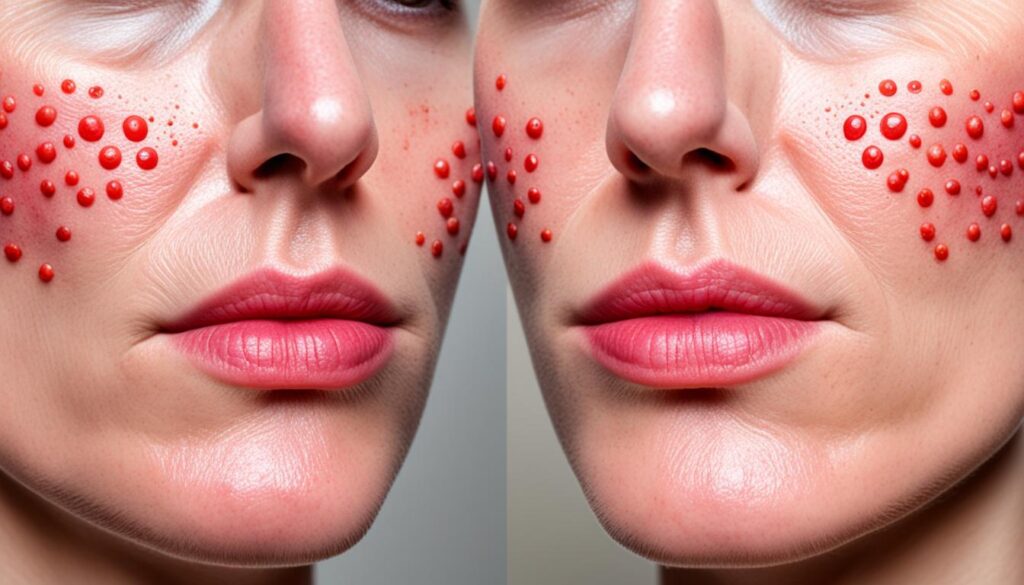
Understanding hormonal cystic acne’s causes and signs helps you fight this tough skin issue. Keep reading for more on how hormones affect acne and effective treatments.
Read Also : Glowing Mom: Clear Skin, Happy Bump.
The Role of Hormones in Cystic Acne Development
Understanding how hormones affect cystic acne is key to finding the right treatment. Hormones, especially androgens like testosterone, are important in this skin issue.
When hormones are out of balance, it can make more oil in the skin. This can lead to clogged pores and a place where bacteria can grow. This is often seen in conditions like polycystic ovary syndrome (PCOS), which can cause big, deep cysts.
>>Get Your Secret Guide Here<<
High androgen levels, from natural changes or health issues, are a common cause of cystic acne. This extra testosterone makes the sebaceous glands produce more sebum. This leads to the typical hormonal cystic acne.
“Hormones are the driving force behind cystic acne, and understanding their role is essential for effective treatment.”
Fixing hormonal imbalances is a big step towards clearer skin. A good plan might include skincare tips, changing your diet, and possibly seeing a doctor. This can help manage hormonal cystic acne.
| Hormone | Effect on Cystic Acne |
|---|---|
| Testosterone | Increased oil production and clogged pores |
| Estrogen | Regulates sebum production and inflammation |
| Progesterone | Can make acne worse |
Fixing hormonal imbalances helps get clearer, healthier skin. A good plan should include skincare, diet changes, and maybe doctor visits. This can help control hormonal cystic acne.
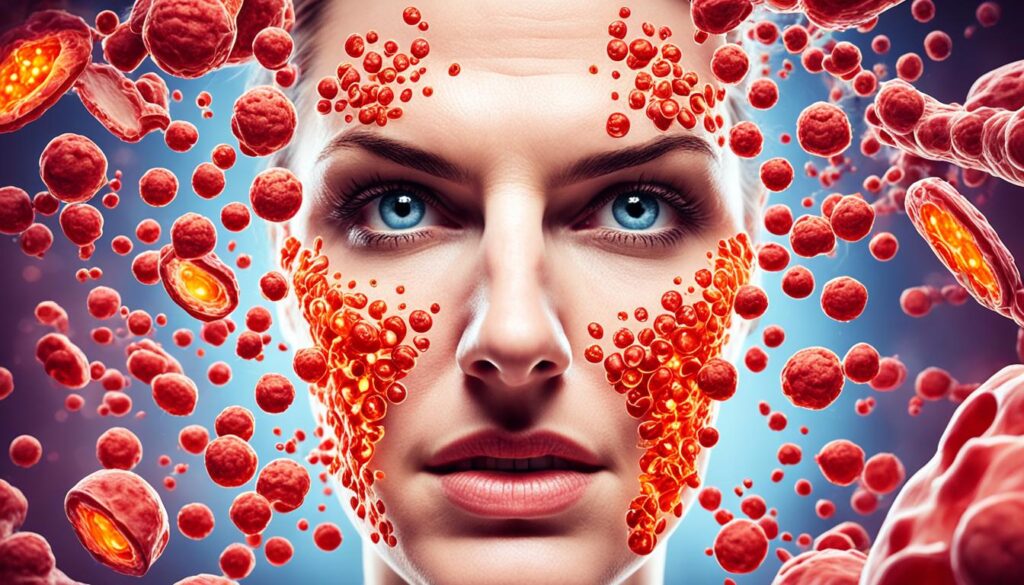
Hormonal Cystic Acne Skincare Routine
Creating a good skincare routine is key for managing hormonal cystic acne. It’s important to tackle the main causes of this tough skin issue with a detailed plan.
Step 1: Gentle Cleansing
Begin with a gentle, non-irritating cleanser. It should remove oil, dirt, and impurities without drying out your skin. Stay away from harsh products that can make cystic acne worse.
Step 2: Exfoliation with Salicylic Acid or Retinoids
Use exfoliants like salicylic acid or retinoids to open up pores and help skin cells renew. These ingredients clear away dead skin and stop new clogs from forming.
Step 3: Treating with Benzoyl Peroxide or Antibiotics
For specific treatment, benzoyl peroxide or antibiotics can help. They target the bacteria that cause hormonal cystic acne. These ingredients lessen inflammation and kill bacteria that cause painful breakouts.
>>Get Your Secret Guide Here<<
By following this detailed skincare routine, you can tackle the main causes of your hormonal cystic acne. This leads to clearer, healthier skin.
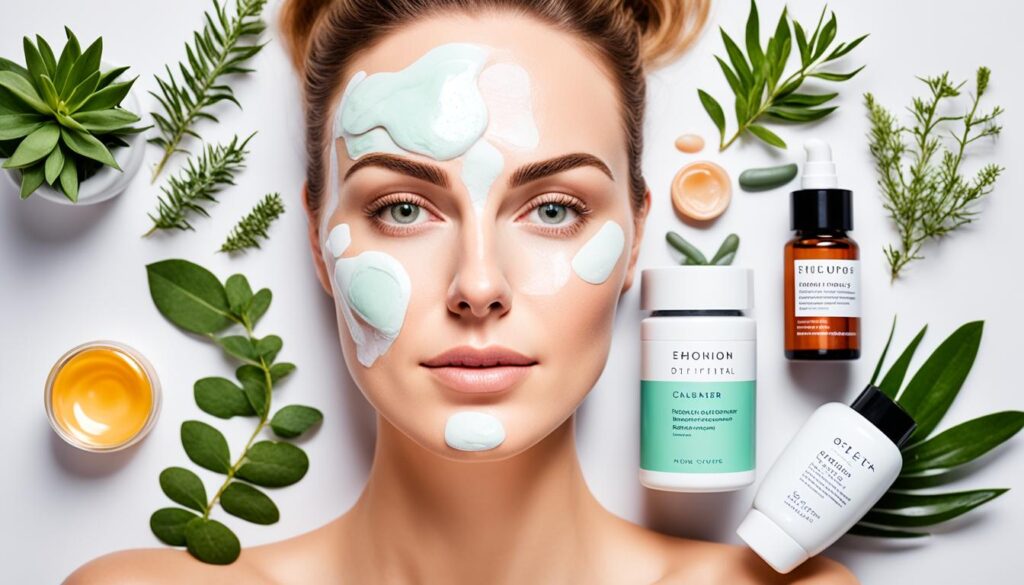
Acne-Fighting Ingredients to Look for in Skincare Products
When fighting hormonal cystic acne, it’s crucial to find skincare products with strong acne-fighting ingredients. These ingredients can tackle the root causes of breakouts and ease the pain of stubborn cysts.
Salicylic Acid for Unclogging Pores
Salicylic acid is a beta hydroxy acid that deeply cleans pores. It breaks down dead skin cells, oil, and dirt. This helps stop clogged pores and prevents cystic acne.
Benzoyl Peroxide for Killing Bacteria
Benzoyl peroxide is a strong antibacterial agent. It targets the bacteria that cause acne. By killing this bacteria, it reduces inflammation and stops new breakouts.
Retinoids for Regulating Cell Turnover
Retinoids, like adapalene or tretinoin, manage the skin’s cell turnover. They prevent pores from clogging with dead cells, oil, and bacteria. This tackles the main causes of cystic acne.
Using these ingredients in your skincare routine can change the game against hormonal cystic acne. They target different factors that cause breakouts, leading to clearer, healthier skin.
>>Get Your Secret Guide Here<<
The Importance of Oil-Free and Non-Comedogenic Moisturizers
Managing hormonal cystic acne means taking good care of your skin. Choosing the right moisturizer is key. Look for ones that are oil-free and non-comedogenic. These moisturizers for acne-prone skin keep your skin hydrated without causing more oil or clogs.
Go for a lightweight, oil-free moisturizer that won’t make your skin feel heavy. Non-comedogenic moisturizers are made to not block your pores. This keeps your skin clear and hydrated. Using a hydrating skincare product that’s right for cystic acne helps keep your skin healthy and prevents more breakouts.
| Moisturizer Type | Benefits for Cystic Acne |
|---|---|
| Oil-Free | Provides hydration without contributing to excess oil production |
| Non-Comedogenic | Avoids clogging pores and worsening breakouts |
Finding the right oil-free moisturizers and non-comedogenic moisturizers can really help with your acne. Adding these hydrating skincare products to your routine can lead to clearer, healthier skin.
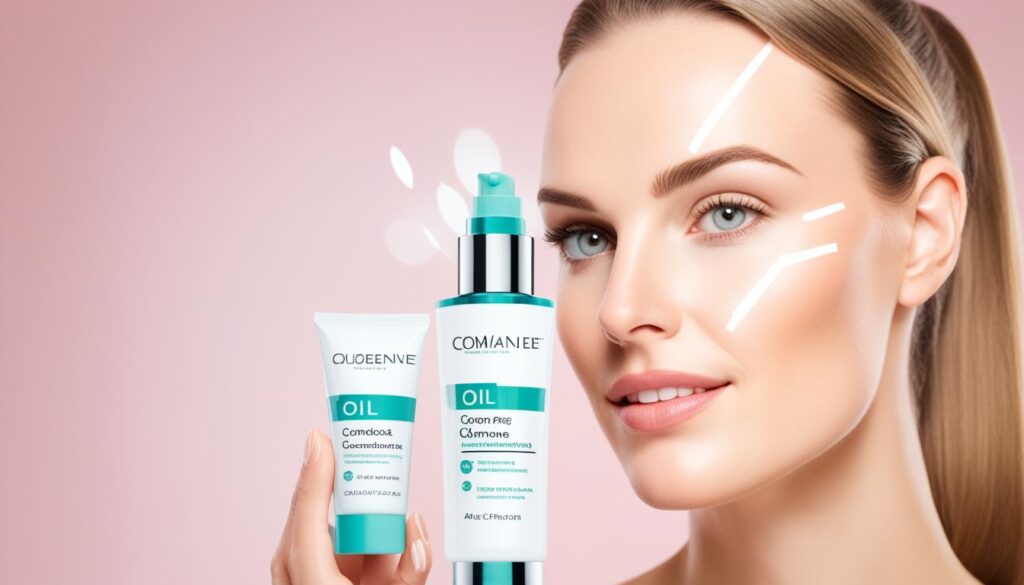
Anti-Inflammatory Skincare for Reducing Cystic Acne Flare-Ups
Cystic acne can be tough and painful, often causing inflammation that makes blemishes look red and swollen. Luckily, using anti-inflammatory ingredients in your skincare can help. These ingredients can ease flare-ups and speed up healing.
Green tea is a great choice for skincare products fighting inflammation. It’s full of antioxidants and has anti-inflammatory properties. These help reduce redness and swelling from cystic acne.
Licorice root is another good option. It has glycyrrhizin, which fights inflammation. This can make acne-prone skin calm and lessen the severity of cystic breakouts.
Niacinamide, or vitamin B3, is also key for calming acne-prone skin. It’s known for lowering inflammation, clearing pores, and controlling sebum. These actions can help prevent cystic acne.
>>Get Your Secret Guide Here<<
Adding anti-inflammatory skincare products with these ingredients to your daily routine can help. You’ll be on your way to reducing cystic acne flare-ups and getting clearer skin.
| Anti-Inflammatory Ingredient | Benefits for Cystic Acne |
|---|---|
| Green Tea | Rich in antioxidants, helps calm redness and swelling |
| Licorice Root | Contains glycyrrhizin, a compound with strong anti-inflammatory effects |
| Niacinamide | Reduces inflammation, unclogs pores, and regulates sebum production |
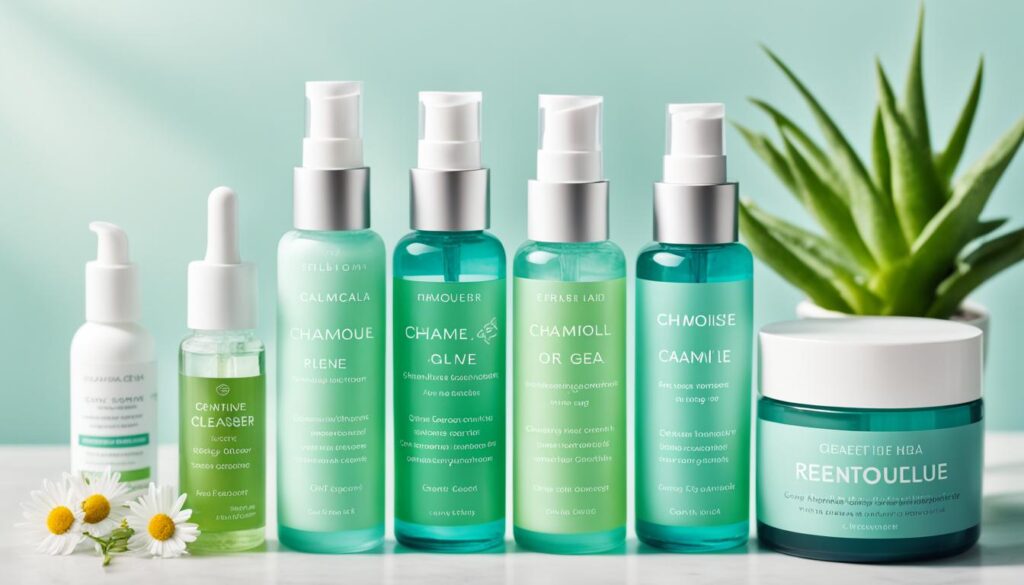
“Incorporating anti-inflammatory ingredients into your skincare routine can be a game-changer for managing cystic acne flare-ups.”
Hormonal Cystic Acne and Diet: Foods to Avoid and Embrace
If you’re dealing with hormonal cystic acne, what you eat might be a big factor. Some foods can make breakouts worse by causing inflammation or messing with your hormones. Others can help balance your hormones and reduce inflammation, making your skin healthier.
Foods to Avoid
- Processed, high-glycemic carbohydrates, like white bread, pastries, and sugary snacks, can spike your blood sugar and insulin levels. This can lead to more inflammation and worse acne.
- Dairy products, especially cow’s milk and cheese, can cause cystic acne by affecting hormone levels.
- Foods high in unhealthy fats, such as fried and fast foods, can cause inflammation and block pores, making acne worse.
Foods to Embrace
Instead, eat a diet full of whole, nutrient-rich foods that can help control your hormones and lessen inflammation:
- Fruits and vegetables are full of antioxidants, vitamins, and minerals that are good for your skin.
- Whole grains, like brown rice, quinoa, and oats, have a lower glycemic index. They help keep your blood sugar stable.
- Lean proteins, such as chicken, fish, and legumes, give you the nutrients you need without the inflammation of high-fat meats.
- Anti-inflammatory spices, like turmeric and ginger, can be added to your meals to fight inflammation from the inside.
By choosing foods wisely and adding these skin-friendly options to your diet, you can help your body work better. This can lead to clearer, healthier skin.
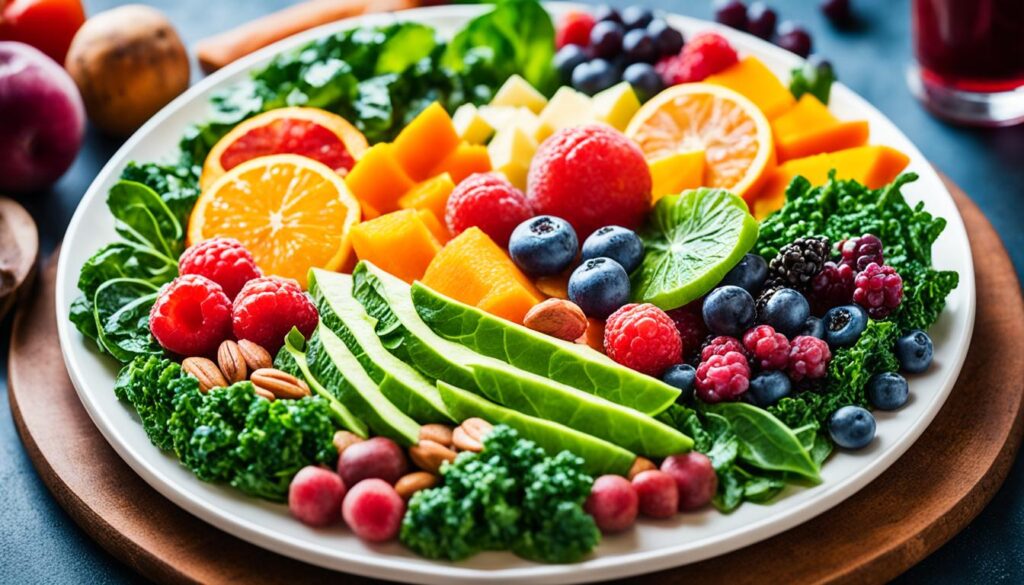
“Nutrition plays a critical role in the management of hormonal cystic acne. By being mindful of the foods you consume, you can reduce inflammation and support your body’s natural hormonal balance.”
Complementary Therapies for Hormonal Cystic Acne Management
Dealing with hormonal cystic acne needs a full approach. Your skincare and diet are key, but adding other therapies can help too. These therapies support you in fighting this tough skin issue.
>>Get Your Secret Guide Here<<
Supplements and Herbs for Hormonal Balance
Some supplements and herbs might help balance your hormones and lessen inflammation. This can help with hormonal cystic acne. Here are a few to consider:
- Zinc – This important mineral can reduce inflammation and help control hormone levels.
- Evening Primrose Oil – It’s full of gamma-linolenic acid, which can balance hormones and ease acne.
- Saw Palmetto – This herb is used for hormonal imbalances, including acne.
Before adding supplements or herbs, talk to a healthcare expert. They can tell you about possible side effects or interactions with your medicines.
Stress Management Techniques
Stress can make hormonal cystic acne worse. Using stress management can lessen its effects on your skin. Here are some ways to help:
- Meditation – Meditation can lower stress and inflammation, which helps with acne.
- Yoga – Yoga is good for stress and overall health, which can improve hormonal balance.
- Deep Breathing – Deep breathing exercises can calm you down and manage stress.
Combining skincare, diet, and these therapies can help you fight hormonal cystic acne. This approach aims for clearer, healthier skin.
Hormonal Cystic Acne Skincare Routine for Different Skin Types
Dealing with hormonal cystic acne means finding the right skincare for your skin type. Whether your skin is oily, dry, or a mix, changing your skincare can help control breakouts.
Oily or Acne-Prone Skin
If your skin is oily or prone to acne, use products that are oil-free and won’t block your pores. Add ingredients like salicylic acid to clean deep and benzoyl peroxide to fight bacteria that cause acne.
>>Get Your Secret Guide Here<<
Dry or Sensitive Skin
For dry or sensitive skin, be careful when you clean and exfoliate. Choose products that are hydrating and calm, such as ceramides and niacinamide.
Combination Skin
If you have combination skin, you’ll need to care for both your T-zone and cheeks/jawline differently. Use a light, oil-free moisturizer on oily spots and richer moisturizers on dry areas.
| Skin Type | Recommended Cystic Acne Skincare Routine |
|---|---|
| Oily/Acne-Prone |
|
| Dry/Sensitive |
|
| Combination |
|
Adjusting your skincare to fit your skin type helps you tackle cystic acne effectively. This way, you can get clearer, healthier skin.
When to Seek Professional Help for Cystic Acne Treatment
While home skincare can help many, sometimes you need a pro for hormonal cystic acne. If your acne won’t go away or is very bad, see a dermatologist. They offer prescription-strength medications, birth control, or treatments in their office to help.
Don’t wait to get expert advice if your skin needs more help. Professional cystic acne treatment can really change your skin for the better.
Signs It’s Time to See a Dermatologist
- Your cystic acne is severe, with large, painful nodules or cysts
- Your breakouts are persistent and not improving with over-the-counter products
- You’re experiencing scarring or hyperpigmentation from your cystic acne
- Your acne is accompanied by other hormonal imbalances, such as irregular periods or excess facial hair
>>Get Your Secret Guide Here<<
What to Expect from a Dermatologist Visit
Your dermatologist will check how bad your cystic acne is and suggest the best treatment. This might include:
- Prescription acne medications, like creams, antibiotics, or birth control pills
- In-office procedures, such as injections or laser treatments, to lessen swelling and prevent scars
- Advice on an effective skincare routine to go with your treatments
With the right professional cystic acne treatment, you can get the clear, confident skin you want.
“Seeking professional help for severe cystic acne is a sign of strength, not weakness. It’s the first step towards regaining control of your skin and overall well-being.”
Hormonal Cystic Acne Skincare Routine for Men
Men often have more testosterone, which can lead to hormonal cystic acne. To fight this, a special skincare routine is needed. It must tackle the unique issues men face, like too much oil and irritation after shaving. The goal is to use products that fight acne and are gentle on the skin.
At the core of this routine are cystic acne skincare for men, male hormonal acne treatment, and acne-fighting products for men. These products aim to tackle the deep causes of hormonal cystic acne. By adding them to a skincare routine for men with cystic acne, you can control breakouts and get clear skin.
Cleansing and Exfoliating for Oil Control
Start with a gentle, oil-free cleanser to remove dirt and excess oil. Then, exfoliate once a week with a scrub or product that has salicylic acid or retinoid. This helps clear pores and keeps skin fresh.
Targeted Acne Treatment
Use a spot treatment with benzoyl peroxide or an antibiotic to fight the bacteria causing cystic acne. Apply it only on the affected spots, not all over your face.
>>Get Your Secret Guide Here<<
Hydration and Soothing Care
Keep your skin moisturized with a formula that won’t clog pores. Ingredients like green tea or aloe vera can also reduce redness and inflammation.
| Ingredient | Function |
|---|---|
| Salicylic Acid | Unclogs pores and regulates cell turnover |
| Benzoyl Peroxide | Kills acne-causing bacteria |
| Retinoids | Promotes cell renewal and reduces inflammation |
| Non-comedogenic Moisturizers | Hydrates without clogging pores |
By using these key elements in your skincare routine for men with cystic acne, you can control hormonal breakouts. This leads to a clear, healthy complexion you’ll be proud of.
Dealing with Acne Scarring and Hyperpigmentation
Cystic acne can leave behind scarring and discoloration even after it clears up. It’s important to address these issues for a clear, radiant complexion. With the right skincare, you can lessen the effects of cystic acne on your skin.
To fade acne marks and hyperpigmentation from cystic acne, use brightening ingredients. Look for products with vitamin C, niacinamide, and kojic acid. These ingredients can even out your skin tone and fade marks.
For acne scarring treatment, retinoids and chemical exfoliants work well. Retinoids like adapalene or tretinoin help smooth scars by stimulating cell turnover. Chemical exfoliants with alpha-hydroxy acids (AHAs) or beta-hydroxy acids (BHAs) gently remove the top skin layer to fade acne marks.
| Ingredient | Benefit |
|---|---|
| Vitamin C | Brightens and evens out skin tone |
| Niacinamide | Reduces the appearance of hyperpigmentation |
| Kojic Acid | Inhibits melanin production to fade dark spots |
| Retinoids | Stimulate cell turnover to smooth acne scars |
| AHAs/BHAs | Gently exfoliate to fade acne marks |
With patience and a consistent skin brightening for post-acne marks routine, you can reduce the effects of cystic acne. You can get back your clear, radiant complexion.
Lifestyle Changes to Support Clear Skin
Getting clear, healthy skin is more than just about skincare and diet. Making lifestyle changes can help a lot with hormonal cystic acne. Factors like stress, sleep, exercise, and hydration can make your skin better and help you look radiant.
Manage Stress for Clearer Skin
Stress can mess with our hormone levels, making acne worse. Using stress-reducing activities like meditation, yoga, or deep breathing can help. These methods balance your hormones and lessen inflammation that causes acne.
>>Get Your Secret Guide Here<<
Prioritize Quality Sleep
Good sleep is key for skin health. It helps control hormones. Try to get 7-9 hours of sleep each night. This helps your body repair itself and can make your skin look better.
Stay Active with Exercise
Exercise is good for your health and skin. It lowers inflammation, boosts circulation, and releases endorphins. These can help clear your skin and manage acne.
Hydrate for Acne-Prone Skin
Drinking enough water is vital for skin health. It keeps the skin’s barrier strong and prevents dryness, which can make acne worse. Drink lots of water to keep your skin healthy and reduce breakouts.
Adding these lifestyle changes to your skincare routine can help manage hormonal cystic acne. It supports your goal of having clear, glowing skin.
Conclusion
Conquering hormonal cystic acne means tackling it from all angles. It’s about understanding how hormones affect your skin and using the right skincare products. By doing this, you can take charge of your skin and get the clear, glowing skin you want.
When it comes to skincare for hormonal cystic acne, start with gentle cleansers. Then, use exfoliants like salicylic acid or retinoids to remove dead skin cells. Don’t forget to use treatments with benzoyl peroxide or antibiotics to fight acne.
Choosing oil-free and non-comedogenic moisturizers is key. Also, adding anti-inflammatory skincare products can help lessen acne outbreaks.
>>Get Your Secret Guide Here<<
For clear skin, be patient and stay consistent. Finding the right products and strategies might take time, depending on your skin type and hormonal changes. Stick with it, and you’ll see your skin get healthier and clearer. This will boost your confidence and give you the clear skin you’ve always wanted.
FAQ
What is hormonal cystic acne and how can I identify it?
Hormonal cystic acne is a severe acne type marked by deep, painful blemishes under the skin. It’s caused by hormone changes, like testosterone and androgen levels, which increase oil production and clog pores. Symptoms include large, inflamed nodules or cysts on the chin, jawline, and cheeks.
How do hormones contribute to the development of cystic acne?
Changes in hormones, especially androgen hormones like testosterone, can boost oil production. This leads to clogged pores and a perfect spot for bacteria to grow. This imbalance is often seen in conditions like polycystic ovary syndrome (PCOS) and helps form large, deep cysts.
What should my skincare routine look like for hormonal cystic acne?
For managing hormonal cystic acne, a good skincare routine is key. Start with a gentle cleanser. Then, use exfoliants like salicylic acid or retinoids to clear pores and speed up cell renewal. Add benzoyl peroxide or antibiotics to target acne-causing bacteria.
What key ingredients should I look for in my skincare products?
Look for products with salicylic acid, benzoyl peroxide, and retinoids. These ingredients help by unclogging pores, killing bacteria, and speeding up cell turnover. They address the main causes of hormonal cystic acne.
Why is it important to use oil-free and non-comedogenic moisturizers?
Using oil-free and non-comedogenic moisturizers is key for managing hormonal cystic acne. These moisturizers hydrate without clogging pores or making breakouts worse. They help keep the skin moisturized without adding to the acne problem.
How can anti-inflammatory ingredients help with cystic acne?
Cystic acne often brings inflammation, causing painful, swollen spots. Using anti-inflammatory ingredients like green tea, licorice root, and niacinamide can help reduce inflammation. This can make flare-ups less severe and help skin heal faster.
How can diet impact hormonal cystic acne?
Some foods can make breakouts worse by causing inflammation or upsetting hormone balance. Avoid processed carbs, dairy, and unhealthy fats. Instead, eat more fruits, veggies, whole grains, and lean proteins. These foods can help control hormones and reduce inflammation.
What other therapies can help manage hormonal cystic acne?
Adding supplements and herbs like zinc, evening primrose oil, and saw palmetto can help balance hormones and reduce inflammation. Stress management through meditation and yoga can also support managing hormonal cystic acne.
When should I consider seeking professional help for my cystic acne?
If your acne doesn’t get better with home treatments or is very severe, see a dermatologist. They can offer specialized care, including strong medications, birth control pills, or treatments in the office, to help control your cystic acne.